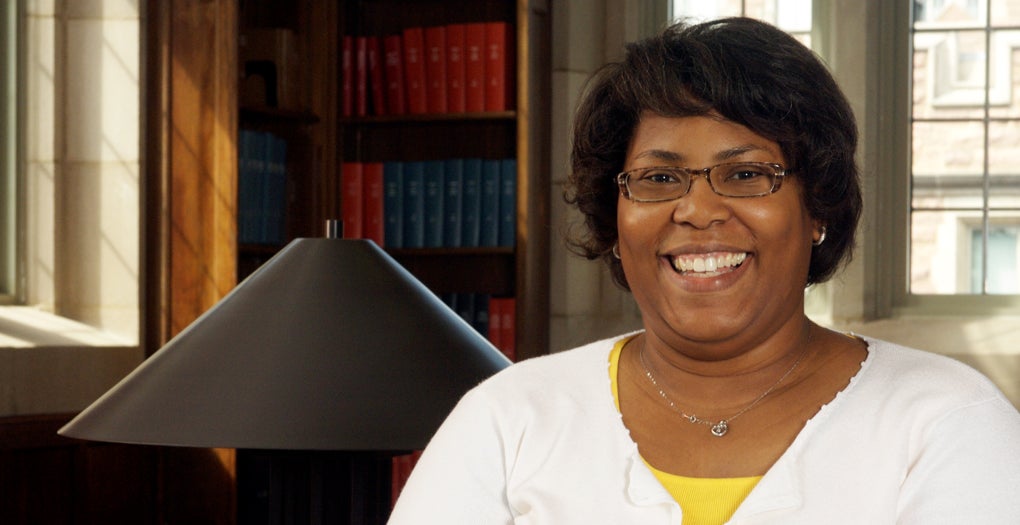Changing the Narrative
Changing the Narrative Heading link

Dr. Henrika McCoy is trying to change the narrative about who Black men are.
“We often hear that Black men are criminals and thugs, and Black juveniles have been called super predators,” says McCoy, Interim Associate Dean for Academic Affairs and Student Services and Associate Professor in the Jane Addams College of Social Work. “It’s dehumanizing and denigrating. The truth is, they’re human.”
Regardless of race or gender, the more trauma a juvenile experiences, the more likely he or she is to feel angry and irritable. This can lead to recklessness, poor impulse control and physical aggression. However, young Black men receive the least amount of care for these behaviors. Rather than being treated with appropriate support, these acts are instead read as criminal. When juxtaposed against Black men, McCoy can see the responses to men who look different from Black men, such as white men, are less punitive. She wants us to acknowledge and address this.
In one of her studies, she’s looking at how these mental health issues precipitate Black adolescents into the criminal justice system.
“Often the behaviors of young Black men with mental health issues are criminalized,” says McCoy. “Their behaviors are responded to as if they are crimes while young white men exhibiting the same behaviors receive mental health services. So how do we validate young Black men’s experiences?”
Some studies indicate up to 93 percent of juvenile offenders have histories of trauma. And, as the number of reported traumatic experiences increase, the likelihood of exhibiting anger and irritability also increases. McCoy’s goal is to have the juvenile justice system recognize those histories and treat them with needed services rather than criminalizing them. She hopes to achieve this by strengthening an existing screening instrument used in the juvenile justice system. The instrument is designed to identify mental health conditions among adolescents and emphasize the importance of those conditions when handing down decisions.
Her examination of the instrument has focused on clarifying its language. In looking at young Black and white adolescent men she found the words they use, and prior experiences, all mattered in how they were treated. For example, what does a “few” mean? What does “anxiety” mean? The words are interpreted differently depending on the participant’s background and experiences, so the language used in the instrument needs to more clearly communicate what’s being asked. That level of specificity can lead to more appropriate recommendations for treatment rather than inaccurate responses, given due to a misunderstanding, pushing kids deeper into the juvenile justice system.
McCoy Quote Heading link
We all deserve justice—it’s important for the world—so let’s say what we mean and do our best to contribute good.
Part 2 Heading link
More recently, McCoy is looking at the violent victimization experiences of emerging adult Black men. This population experiences violence the most, but most research focuses on them as perpetrators rather than victims and survivors.
“We’ve created a myth that Black men have to be doing something wrong to be violated; that is not the case,” says McCoy. “We’re trying to understand how these violent experiences affect them.”
The likelihood is high that Black men ages 18 to 24 have been victimized in some form, if not multiple forms, by violence. To uncover this her team interviewed groups of Black men, and women who have knowledge of violence Black men have experienced, and found ten categories of commonly experienced violence. They included physical assault, school violence, gang violence, assault by the police, and hate crimes due to race. The new knowledge should influence how funding dollars are allocated and demonstrate the need to provide mental health and health care services for this vulnerable population.
Unfortunately, the study was prematurely discontinued. “As a society we inflict violence on Black men, but the victims of the violence, Black men, are being criminalized for it,” says McCoy. “Studies like this are important work for our larger society, and when the administration, and related priorities, change at the federal level, the implications can be significant.”
“Some who believe in social justice don’t believe in righting all the world’s injustices,” says McCoy. “The term ‘social justice’ is often an excuse to not focus on specific injustices in our society. We all deserve justice—it’s important for the world—so let’s say what we mean and do our best to contribute good.”